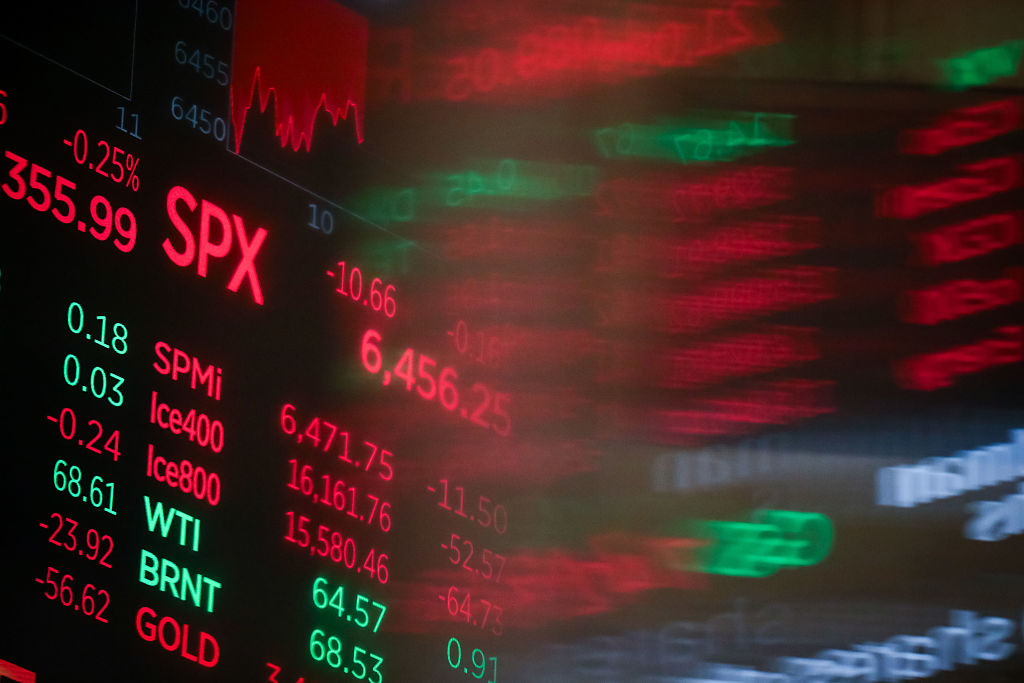5 Stock Picks That Now Pay Dividends
Retirees take note: Dividend stocks have been proven to outperform their non-paying peers over time.

Profit and prosper with the best of Kiplinger's advice on investing, taxes, retirement, personal finance and much more. Delivered daily. Enter your email in the box and click Sign Me Up.
You are now subscribed
Your newsletter sign-up was successful
Want to add more newsletters?

Delivered daily
Kiplinger Today
Profit and prosper with the best of Kiplinger's advice on investing, taxes, retirement, personal finance and much more delivered daily. Smart money moves start here.

Sent five days a week
Kiplinger A Step Ahead
Get practical help to make better financial decisions in your everyday life, from spending to savings on top deals.

Delivered daily
Kiplinger Closing Bell
Get today's biggest financial and investing headlines delivered to your inbox every day the U.S. stock market is open.

Sent twice a week
Kiplinger Adviser Intel
Financial pros across the country share best practices and fresh tactics to preserve and grow your wealth.

Delivered weekly
Kiplinger Tax Tips
Trim your federal and state tax bills with practical tax-planning and tax-cutting strategies.

Sent twice a week
Kiplinger Retirement Tips
Your twice-a-week guide to planning and enjoying a financially secure and richly rewarding retirement

Sent bimonthly.
Kiplinger Adviser Angle
Insights for advisers, wealth managers and other financial professionals.

Sent twice a week
Kiplinger Investing Weekly
Your twice-a-week roundup of promising stocks, funds, companies and industries you should consider, ones you should avoid, and why.

Sent weekly for six weeks
Kiplinger Invest for Retirement
Your step-by-step six-part series on how to invest for retirement, from devising a successful strategy to exactly which investments to choose.
Investors may cherish dividend stocks and the steady stream of income they provide—but they get twitchy around companies initiating a dividend. Some argue that starting a payout is an admission that the company’s best growth days are behind it.
Sonia Joao, president of Houston-based advisory firm Robertson Wealth Management, disagrees. “Paying a dividend doesn’t suggest slower growth ahead,” she says. “If anything, it’s the exact opposite. Precisely because the company expects durable growth, they’re more willing to part with their cash.”
This isn’t just academic. Dividend stocks have been proven to outperform their non-paying peers over time. Dividend payers in Standard & Poor’s 500-stock index enjoyed returns of 9.3% annually from 1972 to 2017, according to Ned Davis Research, while the non-payers delivered returns of just 2.6%. Stocks that initiated or grew their dividends fared best of all, posting average annual returns of 10.1%.
From just $107.88 $24.99 for Kiplinger Personal Finance
Become a smarter, better informed investor. Subscribe from just $107.88 $24.99, plus get up to 4 Special Issues

Sign up for Kiplinger’s Free Newsletters
Profit and prosper with the best of expert advice on investing, taxes, retirement, personal finance and more - straight to your e-mail.
Profit and prosper with the best of expert advice - straight to your e-mail.
Here are five stocks that have initiated a dividend within the past five years. Their yields (as of April 4) range widely, but all have made a commitment to start rewarding their patient shareholders with a regular cash payout.
Constellation Brands (STZ); recent share price: $191; dividend yield: 1.5%. The largest publicly traded wine producer also markets beer under Corona, Modelo and other brands. After initiating a 31-cent quarterly dividend in 2015, the company bumped it to 40 cents in 2016 and 52 cents in 2017. Constellation’s current 74-cent distribution is more than double its original payout. The yield remains modest, at about 1.5%, but with a payout ratio of just 17%, there’s plenty of room to keep bulking up that dividend.
eBay (EBAY); $38; 1.5%. Fully 24 years after its start as a public company, the online auction and payments pioneer declared its first dividend earlier this year at 14 cents a share. That gives the stock a modest yield of about 1.5%, slightly below the S&P 500’s 2.0% yield. But aggressive dividend growth is feasible. At current levels, eBay is paying out only 22% of profits in dividends.
The company has been quietly growing its business. Revenues per share have risen 54% since 2015, when eBay spun off payments company PayPal.
General Motors (GM); $39; 3.9%. GM, which paid dividends in the past, was a casualty of the 2008 meltdown. The original GM was forced to undergo a bankruptcy reorganization in 2009 that wiped out shareholders, but it issued new shares in a 2010 initial public offering.
The new GM paid its first quarterly dividend of 30 cents per share five years ago. Its current dividend of 38 cents per share gives the stock a 3.9% yield—one of the highest in the S&P 500.
Realogy Holdings (RLGY); $12; 3.0%. Realogy provides an assortment of real estate and relocation services, operating under the Century 21, Coldwell Banker, Sotheby’s International Realty and other brand names. The company initiated a dividend in 2016, and with its current dividend of 9 cents per share, it yields a very respectable 3.0%.
Realogy’s profits are somewhat cyclical, based on the ebb and flow of the residential real estate market. But a 33% payout ratio gives the company room to produce meaningful dividend growth in the years ahead, particularly when the housing market picks up.
Valvoline (VVV); $19; 2.2%. This supplier of automotive services and lubricants has a history dating back to 1866, but it’s practically a baby as a public company. It was spun off from parent Ashland in 2016. Valvoline declared its first dividend that year and has already juiced the payout by 116% to a current 10.6 cents per share, giving the stock a 2.2% yield. The company’s modest dividend payout ratio of 28% leaves ample room for growth.
Longer term, the rise of electric vehicles may mean waning demand for Valvoline’s lubricants and services. But even if electric vehicle sales increase, the existing base of traditional gasoline engines would be enough to keep Valvoline in business for a long time to come.
Profit and prosper with the best of Kiplinger's advice on investing, taxes, retirement, personal finance and much more. Delivered daily. Enter your email in the box and click Sign Me Up.

Charles Lewis Sizemore, CFA is the Chief Investment Officer of Sizemore Capital Management LLC, a registered investment advisor based in Dallas, Texas, where he specializes in dividend-focused portfolios and in building alternative allocations with minimal correlation to the stock market.
-
 Nasdaq Leads a Rocky Risk-On Rally: Stock Market Today
Nasdaq Leads a Rocky Risk-On Rally: Stock Market TodayAnother worrying bout of late-session weakness couldn't take down the main equity indexes on Wednesday.
-
 Quiz: Do You Know How to Avoid the "Medigap Trap?"
Quiz: Do You Know How to Avoid the "Medigap Trap?"Quiz Test your basic knowledge of the "Medigap Trap" in our quick quiz.
-
 5 Top Tax-Efficient Mutual Funds for Smarter Investing
5 Top Tax-Efficient Mutual Funds for Smarter InvestingMutual funds are many things, but "tax-friendly" usually isn't one of them. These are the exceptions.
-
 Dow Hits New High Then Falls 466 Points: Stock Market Today
Dow Hits New High Then Falls 466 Points: Stock Market TodayThe Nasdaq Composite, with a little help from tech's friends, rises to within 300 points of its own new all-time high.
-
 What Fed Rate Cuts Mean For Fixed-Income Investors
What Fed Rate Cuts Mean For Fixed-Income InvestorsThe Fed's rate-cutting campaign has the fixed-income market set for an encore of Q4 2024.
-
 The Most Tax-Friendly States for Investing in 2025 (Hint: There Are Two)
The Most Tax-Friendly States for Investing in 2025 (Hint: There Are Two)State Taxes Living in one of these places could lower your 2025 investment taxes — especially if you invest in real estate.
-
 The Final Countdown for Retirees with Investment Income
The Final Countdown for Retirees with Investment IncomeRetirement Tax Don’t assume Social Security withholding is enough. Some retirement income may require a quarterly estimated tax payment by the September 15 deadline.
-
 Stock Market Today: Stocks Gain to Start the Short Week
Stock Market Today: Stocks Gain to Start the Short WeekStocks struggled for direction Tuesday, though Intel made a beeline higher on M&A buzz.
-
 457 Plan Contribution Limits for 2026
457 Plan Contribution Limits for 2026Retirement plans There are higher 457 plan contribution limits in 2026. That's good news for state and local government employees.
-
 Medicare Basics: 12 Things You Need to Know
Medicare Basics: 12 Things You Need to KnowMedicare There's Medicare Part A, Part B, Part D, Medigap plans, Medicare Advantage plans and so on. We sort out the confusion about signing up for Medicare — and much more.
-
 The Seven Worst Assets to Leave Your Kids or Grandkids
The Seven Worst Assets to Leave Your Kids or Grandkidsinheritance Leaving these assets to your loved ones may be more trouble than it’s worth. Here's how to avoid adding to their grief after you're gone.